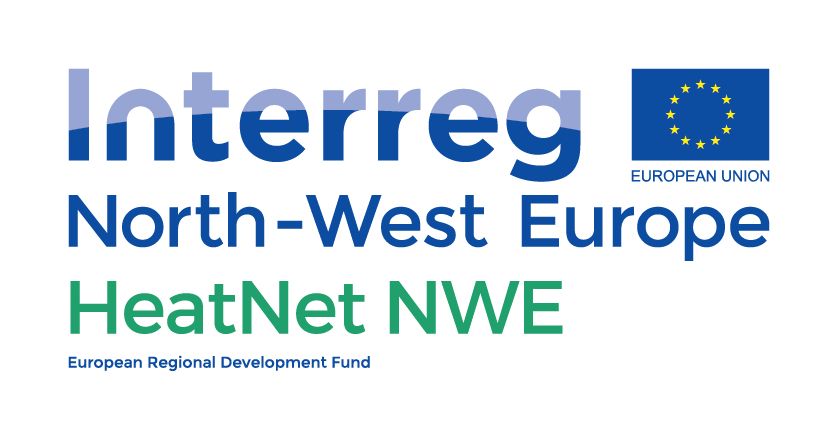HeatNet NWE
The 4th generation district heating arrives in North West Europe

HeatNet NWE addresses the challenge of reducing CO2 emissions in North West Europe (NWE) by creating an integrated transnational NWE approach to the supply of renewable and low carbon heat (incl. waste heat) to residential and commercial buildings, developed and tested in 6 local district heating and cooling networks (DHC) in UK, Ireland, Belgium, France, and the Netherlands.
Objectives of the HeatNet NWE
In North, East and Central Europe DHC supplies up to 50% of heat demand but in NWE only 2-7%. DHC facilitates energy efficiency, less CO2 emissions and a greener economy. The overall objective is to introduce and demonstrate the 4th generation DHC (4DHC) in North West Europe (NWE). This is a low-temperature distribution system that minimises heat loss, integrates energy storage and renewable energy sources, and supplies multiple low energy buildings. The concept requires the development of new institutional and organizational frameworks. The project will result in 15,000 t CO2e saved per annum at its end.
The main outputs are:
- A transferrable HeatNet-model for the implementation of 4DHC schemes in NWE;
- Six living labs develop, test and demonstrate through investments the HeatNet-model to make it robust;
- Transition Roadmaps plan for roll out of new technical, institutional & organizational arrangements in 6 living labs (new roles and responsibilities of stakeholders, regulation & policies, spatial planning, business models & viability, connection to finance and markets, acceptance, etc);
- Promotion and fostering of the HeatNet-model in NWE through Transition Roadmaps to secure wide and long term impact of HeatNet.
The project team (including local authorities, utility companies, academic institutions, consultancy companies) combines emerging NWE-knowhow on 4DHC with the capacity in the long term to reduce institutional & organizational barriers and to deliver permanent infrastructure at local and regional level. Multiple partners expertise is diverse and needed to jointly develop and promote the HeatNet-model and assist 6 successful living labs at the investment sites.
Energy Cities’ role HeatNet NWE?
Energy Cities is leader of the workpackage on Communications and participates in the development of HeatNet NWE model, which includes:
- establishing the Communication Strategy Plan;
- developing the communication tools and following their implementation;
- ensuring the global promotion of HeatNet NWE over the duration of the project;
- assisting partners for the organization of webinars to promote 4DHC technology in NWE;
- following presentations done by partners at national and European events, as well as articles published in specialised magazines and academic journals;
- analysing legislative, economic and financial barriers and proposing recommendations for policy makers,
- publishing a procurement guide to assist local authorities wanting to develop 4DHC.

